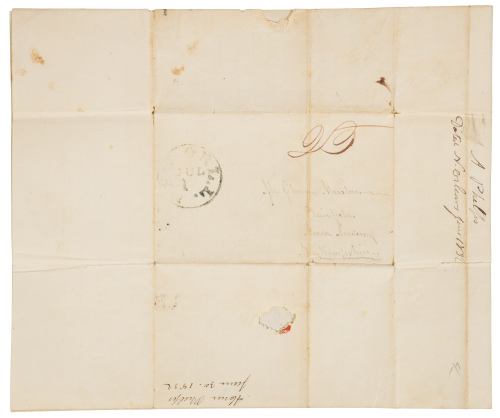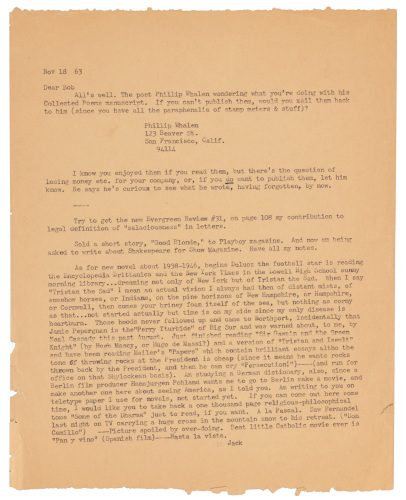Autograph Letter unsigned, 4 pp. To a “brother”, undoubtedly a fellow Minister. Lacking the salutation and signature (though McClure’s identity is confirmed by biographic details as well as naming his Boston brother-in-law in a postscript note). “My residence in that land of slavery and popery, with their attendant abominations, was more pleasant than could have been expected…I had the satisfaction of laboring…for the instruction and salvation of the negroes…you would be gratified if you could ascertain the extent to which the religious instruction of the slaves is carried in the Southern States… [by Ministers of all Christian denominations]. The work goes on systematically, and with increasing vigor… a subject on which I feel very deeply. Happy will it be when the benevolent feeling in the Northern churches, which now rushes with such impetuous tides in the channels of the abolition excitement, shall be turned in this direction. The gospel of salvation is an incomparably better gift than political liberty; besides being a sure and safe preparative for freedom…” McClure had also made progress preaching Temperance to the 8th Infantry soldiers stationed at St. Augustine, about to be sent to Mexico “to fight President Polk’s iniquitous battles. Some of my praying soldiers were killed… their regiment suffered the most of any. I hope they were prepared: but when I suffer myself to think of the atrocity of the orders under which they were thus exposed to a bloody death, I find it hard to keep from ‘speaking evil of the ruler of my people’ and ‘blaspheming the king’…" McClure’s opposition to the Mexican-American War, typical of New England Whigs, was not equaled by his Abolitionist fervor. Opposed as he was to the abomination of slavery, he was not a Garrison radical, insisting that the enslaved should be prepared for Emancipation, his focus being on religion rather than education.
Autograph Letter unsigned, 4 pp. To a “brother”, undoubtedly a fellow Minister. Lacking the salutation and signature (though McClure’s identity is confirmed by biographic details as well as naming his Boston brother-in-law in a postscript note). “My residence in that land of slavery and popery, with their attendant abominations, was more pleasant than could have been expected…I had the satisfaction of laboring…for the instruction and salvation of the negroes…you would be gratified if you could ascertain the extent to which the religious instruction of the slaves is carried in the Southern States… [by Ministers of all Christian denominations]. The work goes on systematically, and with increasing vigor… a subject on which I feel very deeply. Happy will it be when the benevolent feeling in the Northern churches, which now rushes with such impetuous tides in the channels of the abolition excitement, shall be turned in this direction. The gospel of salvation is an incomparably better gift than political liberty; besides being a sure and safe preparative for freedom…” McClure had also made progress preaching Temperance to the 8th Infantry soldiers stationed at St. Augustine, about to be sent to Mexico “to fight President Polk’s iniquitous battles. Some of my praying soldiers were killed… their regiment suffered the most of any. I hope they were prepared: but when I suffer myself to think of the atrocity of the orders under which they were thus exposed to a bloody death, I find it hard to keep from ‘speaking evil of the ruler of my people’ and ‘blaspheming the king’…" McClure’s opposition to the Mexican-American War, typical of New England Whigs, was not equaled by his Abolitionist fervor. Opposed as he was to the abomination of slavery, he was not a Garrison radical, insisting that the enslaved should be prepared for Emancipation, his focus being on religion rather than education.















Testen Sie LotSearch und seine Premium-Features 7 Tage - ohne Kosten!
Lassen Sie sich automatisch über neue Objekte in kommenden Auktionen benachrichtigen.
Suchauftrag anlegen